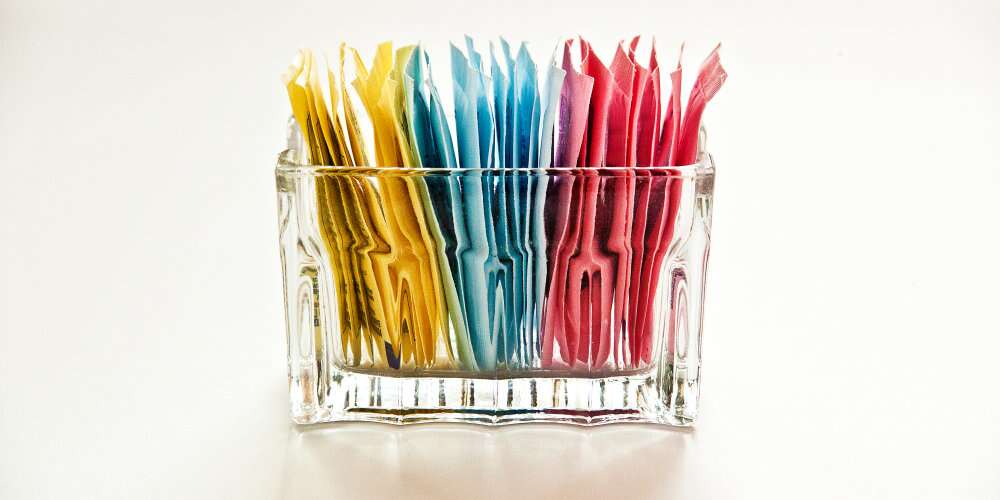New research adds to mounting evidence that artificial sweeteners may be harmful to your health.
A study published Wednesday in the BMJ, which involved more than 100,000 adults in France, found a potential link between consumption of artificial sweeteners and heart disease.
The results showed that participants who consumed large amounts of aspartame — found in the tabletop sweeteners Equal and NutraSweet as well as cereals, yogurt, candy and diet soda — had a higher risk of stroke than people who didn’t consume the sweetener.
Similarly, people who consumed high quantities of sucralose — found in Splenda as well as baked goods, ice cream, canned fruit, flavored yogurt and syrups — and acesulfame potassium, often used in “sugar-free” soda, had a higher risk of coronary heart disease.
“Artificial sweeteners may not be a safe alternative to sugar,” said Mathilde Touvier, the study’s author and a research director at the French National Institute for Health and Medical Research.
Last month, a smaller study found that consuming non-nutritive sweetener — sugar substitutes that contain few calories or nutrients — could alter a person’s gut microbes and potentially elevate blood sugar levels. High blood sugar can increase one’s risk of diabetes, heart disease or stroke.
Prior to that, a June lab study found that artificial sweeteners prompted gut bacteria to invade cells in the intestine wall, which could ultimately raise one’s risk of infection or organ failure.
Other previous research has linked artificial sweeteners to obesity, high blood pressure, diabetes and increased cancer risk as well.
“The more data that comes out showing these adverse health effects, the less we’re going to want to encourage people to switch from added sugars to non-nutritive sweeteners,” said Dr. Katie Page, an associate professor of medicine at the University of Southern California.
But the healthiest course of action, Page said, isn’t to opt for regular sugar instead.
“We really need to encourage people to eat sugar in more moderation and try to decrease sugar consumption,” she said. “And the way to do that isn’t to consume more non-nutritive sweeteners.”
Some sweeteners thought of as natural aren’t preferable either, Page said.
“I definitely would not switch to agave,” she said. “I know people think that’s healthy, but it actually has a very high fructose content.”
An emerging link between sweeteners and heart disease
As a category, artificial sweeteners are low- or no-calorie additives often found in soft drinks and other highly processed foods like yogurt, granola bars, cereal or microwaveable meals. They’re also sold as tabletop sweeteners like Equal, Splenda, Sweet ‘N Low and Truvia.
The sweeteners were originally billed as a healthier replacement for sugar, which is known to promote obesity and diabetes and can increase one’s risk of heart disease if consumed in excess.
Touvier said her study is the first to directly assess how overall dietary consumption of artificial sweeteners impacts one’s risk of heart disease. Previous studies mostly looked at how artificially sweetened beverages impact heart disease risk.
Her team defined a large amount of sweetener as around 77 milligrams per day, on average, which is a little less than two packets of tabletop sweetener.
More than half of the participants’ artificial sweetener consumption came from soft drinks, while 30% came from tabletop sweeteners. Another 8% came from sweetened dairy products like yogurt or cottage cheese with fruit topping.
Sucralose is the most commonly consumed artificial sweetener worldwide, Page said, whereas “aspartame has kind of gotten out of favor, so people aren’t consuming it as much.”
She said sodas are the biggest source of artificial sweeteners in our food supply, though “a lot of the non-nutritive sweeteners people are consuming are coming from foods that you might think of as healthy.”
Two prime examples: flavored yogurts and sports drinks.
The best alternative to sugary food, Page said, is naturally sweet fruit. If water isn’t a satisfying substitute for soft drinks or juice, she suggested carbonated water without artificial sweeteners.
Sweeteners could disrupt your metabolism and elevate blood sugar
A growing body of research suggests that artificial sweetener may disrupt the body’s ability to properly metabolize glucose, which can be a risk factor for diabetes and cardiovascular health issues.
For the study published last month, Israeli researchers asked 120 people to consume four artificial sweeteners — aspartame, saccharin, stevia and sucralose — for two weeks. Participants consumed six sachets of sweetener per day, which is within the Food and Drug Administration’s acceptable intake.
The researchers observed changes in the makeup and function of participants’ gut microbes, which help break down food and ward off disease-causing bacteria. The changes were not seen in people who did not consume artificial sweeteners.
“All four sweeteners changed the microbiome, each in their unique way,” said Eran Elinav, the study’s author and a microbiome researcher at the Weizmann Institute of Science.
Two sweeteners in particular, sucralose and saccharin (found in Sweet ‘N Low), altered some people’s ability to process glucose.
“It changed the way the bugs in their gut are functioning and that, in turn, led to increases in their glucose levels, which is of course not a good thing,” Page said.
The researchers even transferred samples of gut microbes from the study participants with significant metabolism changes into mice. The mice, too, developed blood sugar alterations, Elinav said.
“That’s pretty good evidence suggesting that [artificial sweeteners] have some type of effect on metabolism and on the gut microbiome,” Page said.
Page said her team is now studying how artificial sweeteners affect children’s risk of metabolic conditions like diabetes.
“There’s been very, very few studies in children and there’s data showing that the increases in non-nutritive sweetener consumption are even higher among children and adolescents,” she said.
Source: News.



































